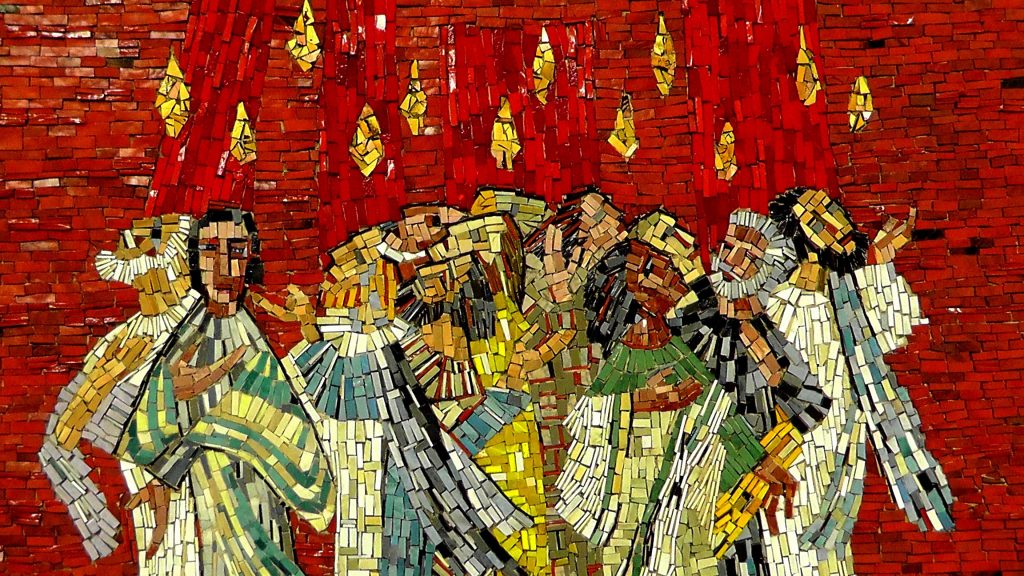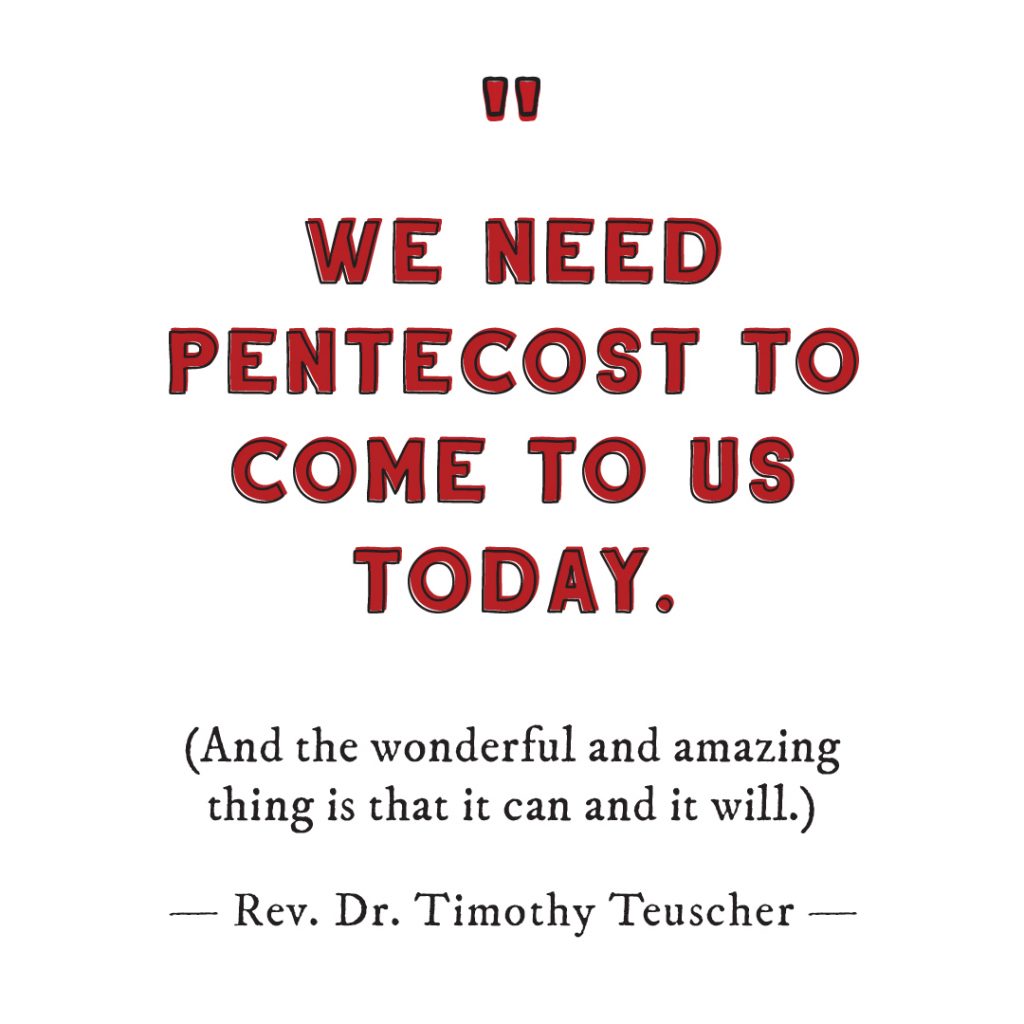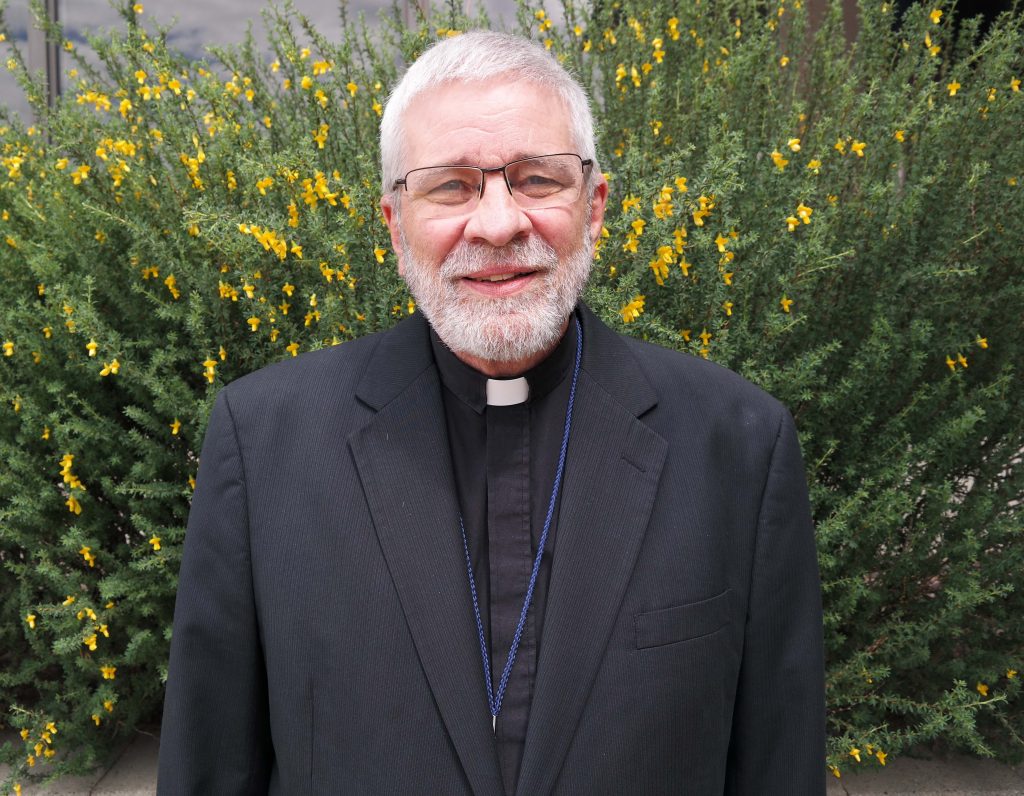Stand Firm in the Faith

by Timothy Teuscher
Amazing things took place on the first Day of Pentecost centuries ago. We hear of the sound of a mighty, rushing wind and tongues of fire. We hear of the gifts of tongues, and how once-timid, fickle men stood up and boldly proclaimed the saving message of Jesus Christ crucified and risen. And we hear how 3,000 people repented of their sins, were baptized, and became members of Christ’s Church and heirs of eternal salvation.
But what has happened to the fires of enthusiasm and conviction that once burned so brightly in the hearts of those who bear the name of Christ?
But what has happened to the fires of enthusiasm and conviction that once burned so brightly in the hearts of those who bear the name of Christ? There was a time when Christians were willing to face persecution and even death for the sake of Christ rather than deny His holy name; but today His name means little, if anything, to many people.
There was a time when Christians eagerly gathered together for worship; today it is often a chore for many who call themselves Christians to attend church even once a month, if at all—something exacerbated over the past couple of years as a result of the pandemic.
There was a time when Christians gave freely to the Lord the first-fruits of what He had given to them; today His Bride, the Church, is a beggarly maid getting by on the crumbs that fall from our tables.
There was a time when Christians were of one heart and mind, holding steadfastly to the pure Word of God, struggling against false teachings with great fervor; today the Church is inundated with doctrinal errors and divisions, a disregard for the truth of God’s Word, and an indifference to the prophetic and apostolic Scriptures.
 There was a time when Christians were moved to do something to help save the souls of those who did not know Jesus Christ as their Lord and Saviour; but today there are many within the Church who couldn’t care less about the eternal destiny even of members of their own families.
There was a time when Christians were moved to do something to help save the souls of those who did not know Jesus Christ as their Lord and Saviour; but today there are many within the Church who couldn’t care less about the eternal destiny even of members of their own families.
There was a time when sin was regarded with utmost seriousness by people, taking to heart the catechism truth that “God threatens to punish all who break His commandments;” but today there are many, even within the Church, who have a cavalier and nonchalant attitude toward sin… who never really admit that they are sinners… who do not intend to amend their sinful lives.
What we need today is to be aroused and fired with the same holy zeal and fervor which marked the first Pentecost. We need an outpouring, a rebirth, a renewal of the Holy Spirit to fill us with that same power and courage with which He once filled those early Christians of long ago. We need Pentecost to come to us today.
And the wonderful and amazing thing is that it can and it will. After all, as St. Peter says at the end of that first Pentecost sermon: “Repent and be baptized, every one of you, in the name of Jesus Christ for the forgiveness of sins, and you will receive the gift of the Holy Spirit. For the promise is for you and your children and for all who are far off” (Acts 2:38-39). Yes, even for people like you and like me who are far off from the time of that first Pentecost by some 2,000 years or so. Even for people like you and like me who are far off from the place of that first Pentecost by thousands of kilometers.
But how exactly can this happen? How can Pentecost take place among us today? How can the Holy Spirit come into the hearts and minds of people in our time? Or, to use the words of our convention theme, how can we “stand firm in the faith”?
Well, certainly not, as the catechism reminds us, “by our own reason or strength.” No, not by some program cranked out by church bureaucrats; not by manipulating people’s feelings and emotions; not by chastising people and urging them on by all kinds of demands and threats. Instead, the answer is found in the simple description of those first Pentecost believers as recorded by St. Luke: “They devoted themselves to the apostles’ teaching and to the fellowship, to the breaking of bread and to prayer” (Acts 2:42).
How do Spirit-filled, baptized, forgiven people of God live? How does the Holy Spirit come to you and remain with you? How does the Holy Spirit empower and equip you to live a life of faithful and dedicated service to our Lord, Jesus Christ? We learn how in Acts. Those early Christians who were cut to the heart and repented of their sins, those baptized people of God who believed in Jesus Christ as their Lord and Savior gathered together regularly and joyfully for “the fellowship”— that is to say, for worship, the Divine Service. And they did not gather to hear about “ten tips for successful living” or “four principles of time management,” but rather to hear “the apostles’ teaching”—that is, the apostolic message of Jesus Christ crucified and risen. They gathered for “the breaking of bread”—for the Lord’s Supper, to eat and to drink the very body and blood of our Lord Jesus Christ. And they gathered together for “prayer,” lifting up their hands together in word and song to their Father in heaven.
This sort of gathering was not merely the effect of the work of the Holy Spirit on that first Pentecost; it was also the way by which He continued to work in them, preserving them in the one true saving faith in Jesus, increasing their understanding of God’s Word, equipping and empowering them to be witnesses in word and in deed to others of this new life in Christ, enabling them to “stand firm in the faith.”
And so, Pentecost can indeed take place among us today as well. When those who are baptized in Christ’s name have hearts of repentance; when they join in worship with fellow believers; when they hear and learn the apostolic teaching of the Scriptures; when they kneel together at the Lord’s Table; when they fold their hands in prayer… then something wonderful is taking place. Then Pentecost is happening again. Then the Holy Spirit comes and fills the hearts of people, kindling in them the fire of His love.
In this way and in this way alone, the Holy Spirit is poured out again and again in order to sustain people—to sustain you—in this one saving faith in Jesus Christ; to give you the strength and the desire to serve your Lord and Savior in an ungodly, unbelieving world; to enable you to “stand firm in the faith.” And that is nothing else than Pentecost happening today!
Do you notice how the six chief parts of the Christian faith as contained in the catechism—the Ten Commandments, the Creed, the Lord’s Prayer, Holy Baptism, the Office of the Keys and Confession, and the Sacrament of the Altar—are reflected in this story? The early Christians strove to live their lives according to God’s will, to His Law, the Ten Commandments. They believed and confessed, heard and learned the apostles’ teaching—teaching later summarized in what we call the Apostles’ Creed, the Nicene Creed, and the Athanasian Creed. They continued steadfast in prayer—especially the prayer that Jesus Himself taught us to pray, the Lord’s Prayer—and all prayers which flow from the Lord’s Prayer. They were baptized in the name of Jesus Christ. They were cut to the heart over their sins, repented of them, and received God’s forgiveness. And they broke bread and ate together with glad and sincere hearts in Holy Communion, the Lord’s Supper.
It was always the same apostolic teaching, the same worship, the same prayer of the Lord, the same Lord’s Supper that was repeated with an almost sublime monotony in the early Church—all with the result that they “received the gift of the Holy Spirit” (Acts 2:38) and “the Lord added to their number daily those who were being saved” (2:47). To this very day, dear brothers and sisters, it is the same. For the Church of all times and all places lives and endures, is empowered and equipped by the Holy Spirit, only—only!—as believers “devote themselves to the apostles’ teaching and to the fellowship, to the breaking of bread and to prayer.”
Sadly, in these last days many pastors and congregations and church bodies have not continued in the apostles’ teaching and the fellowship, in the breaking of bread and in prayer. Instead, they teach and practice something new—something different—in order to supposedly keep up with the times and give people what their itching ears wants to hear.
To be sure, not only to the world out there but even, yes, to us at times, it does seem rather foolish and out-of-date to go on teaching and worshipping, praying, and celebrating the Lord’s Supper the same way today that the Church did on that first Pentecost—to continue teaching the same catechism truths today as the Church has done for the past 500 years—the past 2,000 years. But the fact of the matter is that, because it is through this same old thing—“the apostles’ teaching and the fellowship, the breaking of bread and prayer”—that the Holy Spirit, as the catechism puts it, calls us and continues to call us by the Gospel, enlightens us with His gifts, sanctifies us, and keeps us with Jesus Christ in the one true faith.

In this way and in this way alone, the Holy Spirit is poured out again and again in order to sustain people—to sustain you—in this one saving faith in Jesus Christ; to give you the strength and the desire to serve your Lord and Savior in an ungodly, unbelieving world; to enable you to “stand firm in the faith.” And that is nothing else than Pentecost happening today!
———————
Rev. Dr. Timothy Teuscher is President of Lutheran Church–Canada (LCC). This article is adapted from his sermon at the opening worship service of LCC’s 2022 Synodical Convention.



